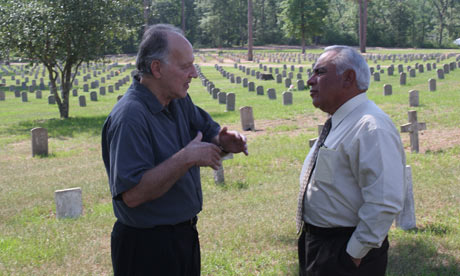
At a key moment in Into the Abyss (2011, Revolver, 12), a quietly metaphysical inquiry into the awful realities of senseless murder and state-sanctioned execution, an off-camera Werner Herzog asks an apparently self-possessed prison chaplain to "tell me about an encounter with a squirrel".
The question, delivered with Herzog's trademark deadpan Bavarian drawl, seems to come from nowhere and to bear little relation to the ongoing discussion about the last hours of condemned inmates facing death by lethal injection. Yet as always with Herzog, there is an insightful intuition at work behind the apparent absurdity of his approach and a moment later the formerly guarded reverend (whose duties on death row await him even as he speaks) is in tears, talking of the sanctity and preciousness of life, however great or small, and apparently confronting the "ecstatic truth" that Herzog has made it his mission to pursue throughout the body of his work, both drama and documentary.
Having once declared that it is the duty of the artist "never to look away", Herzog here focuses on the aftermath of a dismal triple murder notable for the lack of "extenuating circumstances". This was not merely murder for greed and profit, but apparently for something as affectless as convenience – families destroyed for the sake of a car.
Interviewing one young killer who is just days away from execution, Herzog is careful to clarify that he does not have to like or sympathise with his subject, merely to allow him to speak and do him the justice of listening. He also gives ample time to those who seek closure from the enforcement of the ultimate sanction, allowing them to argue that the death penalty is a sort of crucible of evil through which some good may come.
Yet as Herzog teases out stories of cross-generational crime and inherited social dysfunction from his variously shattered interviewees, allowing and encouraging them to cut to the very heart of the matter, it's impossible to feel anything but a sense of loss, sadness and cosmic bewilderment. And while the title of the movie seems at first to refer to the fate of the death row inmates, it soon becomes clear that Herzog is as interested in the mysterious and inconceivable abyss of life (the subtitle is "A Tale of Death, a Tale of Life") as the existential end-point of death. All this from an apparently incidental inquiry about squirrels...
It's easy to be sniffy about glossy B-movie-monger Luc Besson making a foray into socially conscious scenic issue-tainment. Yet remembering what upmarket auteur John Boorman did with Beyond Rangoon in the undeniably dim but not-so-distant past, we should be thankful that Besson's The Lady (2011, Entertainment, 12) is at least functionally pedestrian throughout.
The story could not be more topical, with this account of Aung San Suu Kyi's rise to prominence and subsequent house imprisonment providing a palatable primer for the events unfolding in Burma. As is traditional, the balance between the personal and the political is tipped heavily in favour of the former, with the heroine's separation from her husband and children taking centre stage as her devotion to the nation's cause inevitably erodes her family life.
Yet unlike the peculiarly comparable The Iron Lady, in which the politics is never anything more than flibbertigibbet window dressing, Besson's movie does at least appear to take its social struggles seriously. To this end, The Lady benefits immeasurably from the perfect casting of Michelle Yeoh in the demanding title role – a mixture of strength and fortitude with only a hint of frailty – while David Thewlis provides an excellent foil as her increasingly ailing but utterly devoted soulmate Michael Aris. Personally, I'd take this over "Maggie does Mamma Mia!" any day.
The great triumph of the terrifically indefinable Patience (After Sebald) (2012, Soda, E) is that it manages to bewitch, bother and ultimately bedazzle even those who have no knowledge of – or interest in – the writer whose work it investigates.
I had never read a word of WG Sebald's The Rings of Saturn before sitting down to watch this quietly extraordinary movie, and yet I was instantly gripped by the uncanny atmosphere of Grant Gee's generic hybrid, which plays more like a waking dream than a documentary. Retracing the author's melancholy footsteps around Suffolk, we seem to be lingering for ever on the brink of some awful, awesome revelation, each turn of the journey heavy-laden with history. The memory of war; the nature of walking; the experience of depression; the life of silkworms; the spectre of the Holocaust – all are addressed tangentially, evocatively, intangibly. There is something transcendent here, an evocation of a world just beyond our grasp in which profundity and mundanity sit side by side, both essential elements of the human condition. And I've still never read Sebald...
Finally, three cheers for Mark Cousins's The Story of Film: An Odyssey (2011, Network, 15), an exhaustively idiosyncratic account (all 915 minutes of it!) of the evolution of cinema that reminds us just how personal and poetic serious onscreen film appreciation can be. While the prevailing wind of mainstream TV movie coverage seems to be getting dumb and dumberer by the day, Cousins's outrageously ambitious More4 series proved that one ever-so-slightly unhinged but unapologetic cineaste playing to no one's rules but his own was more entertaining, informative, infuriating, international, inclusive and inspiring than the uninformed burblings of allegedly populist generalists everywhere. Bravo! Bravo!

